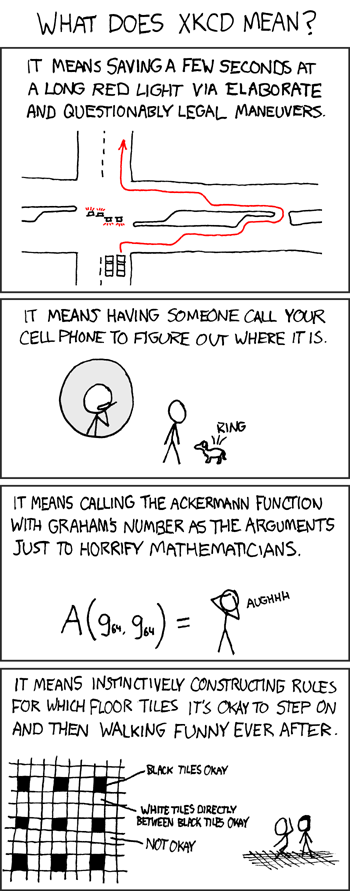Simulist wrote:tazmic wrote:(Compare with a buddhist realizing that this isn't essentially a world of things, and then telling everyone about nothingness. Don't you get the feeling they've missed the point?)
Actually, not so much.

I consider it an example of truth usurping context. What is nothingness in a world that is not one of things? Isn't it obvious that this is a new vision expressed in an old language, with the old paradigm still dictating the interpretation? The cave is full, but the people are now staring at the wall instead of its shadows, still not realizing they are staring at themselves.
(btw, I highly recommend Jay Garfield's magisterial commentary on the Mūlamadhyamakakārikā, if you are not familiar with Nagarjuna and his 'Emptiness of Emptiness', or if you just enjoy logical contortions too subtle for your own good.)
Sorry, I got distracted by "Combinitorial Explosion' and when disappointed to see no mention of Graham's Number was only one click away from
The Curse of Dimensionality, and there was no turning back.

As for the argumentative theory of rationality, I think it's much simpler than that. We need to generate consistent models of our environment, so we don't have conflicting responses, and completeness is never necessary, or more to the point never relevant in an evolutionary context. Consistency is dominant, not rationality, which is a bit of a myth, and secondary environments can be dismissed, or compartmentalized, if we find them interfering with our immediate need for such consistency. Notice that there is no drive in this model for turning our rational cogitations toward the context, which is always calling the shots, regardless of how 'critical' we become. (This makes so much sense it's got to be true, right? I'm going to apply it to everything I see.)
"It ever was, and is, and shall be, ever-living fire, in measures being kindled and in measures going out." - Heraclitus
"There aren't enough small numbers to meet the many demands made of them." - Strong Law of Small Numbers



